
7 Tips for Maintaining a Healthy Digestive System
2 November 2023Gastro: The Ultimate Guide to Everything You Need to Know About This Illness
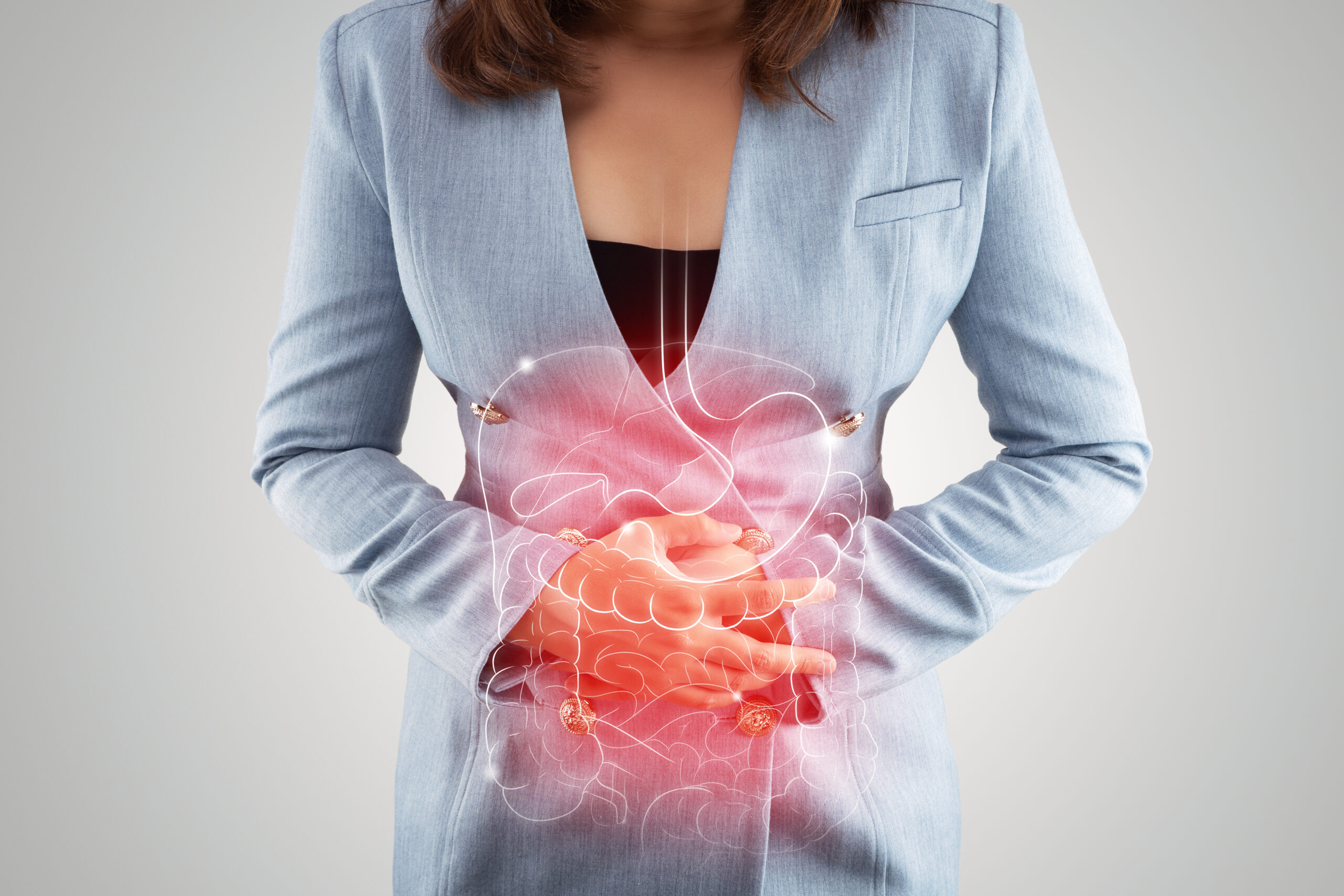
Illustration of internal organs is on the woman's body against the gray background. Business Woman touching stomach painful suffering from enteritis. internal organs of the human body.
Gastroenteritis, more commonly known as “gastro,” is an inflammation of the digestive tract. It can occur all year round, but 80% of cases happen between November and April. It is a highly contagious disease, which is why we talk about a gastroenteritis epidemic when incidence rates are highest. The purpose of this file is to present everything about gastro: from its definition to its treatment, including the different types and causes; you will know absolutely everything about this winter ailment.
What is gastro?
Gastroenteritis is an infection of the digestive system: the stomach, the small intestine, and the large intestine. This infection is due to inflammation of the mucous membranes lining the intestinal wall.
This condition can be of viral, bacterial, or parasitic origin. There are many means of transmission, the most common are: hands, objects, water, and food that are contaminated by viruses, bacteria, or other microorganisms.
This file is meant to be comprehensive and detailed, and is therefore quite long. If you are in a hurry and already know that you are suffering from gastroenteritis: go directly to the end of this article to discover our #solutions to treat your gastro!
The different types of gastro
The winter virus of gastro is divided into several categories. This is explained by its different origins: viral, bacterial, or parasitic gastroenteritis; Depending on the contaminants encountered, you will be dealing with one of these categories.
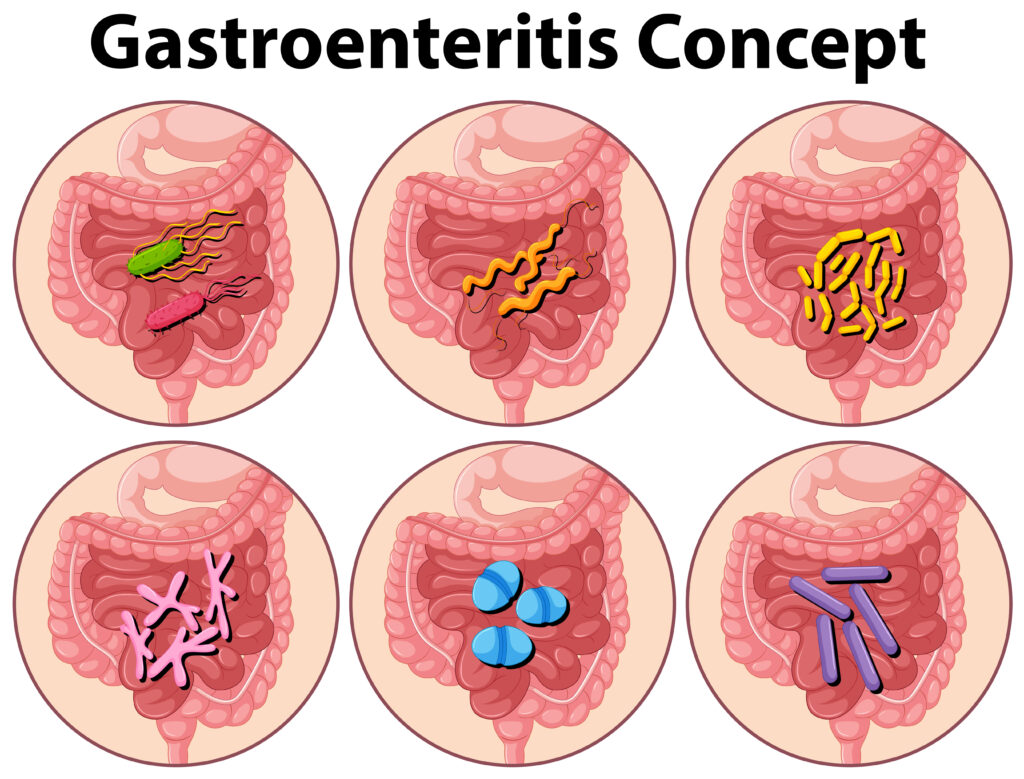
Viral Gastroenteritis
Firstly, we find the most frequent cause of this condition: the virus. The 4 viruses most often implicated are:
- Norovirus
- Calicivirus
- Astrovirus
- Enteric Adenovirus (intestinal)
There are 2 other viruses that occur more rarely, mainly affecting people with weakened immune systems:
- Cytomegalovirus
- Enterovirus
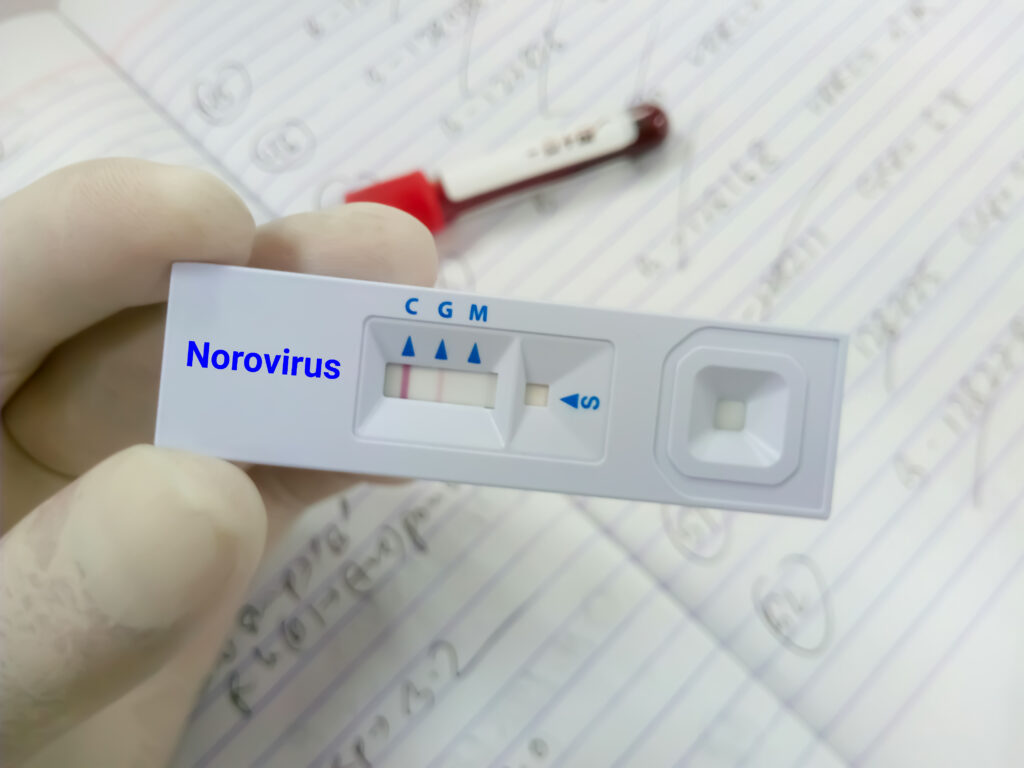
Bacterial Gastroenteritis
Next, in this second category – which is less common than the previous one – a bacterium is the cause of the disease:
- Salmonella
- Shigella
- Yersinia
- Campylobacter
- Vibrio cholerae (better known as cholera)
- Clostridium difficile
- Escherichia coli (also called E.coli)
- Staphylococcus
Important to know! The famous traveler’s diarrhea, also known as turista (or tourista), is the perfect example of bacterial origin gastro. It is mainly the bacterium Escherichia coli that is responsible. It occurs especially during stays in Asia, Africa, Central and Latin America, tropical countries, and regions where hygiene is lacking. It is caused by water and food contaminated with bacteria. You can consult this article: if you are wondering what to eat to harden stools.
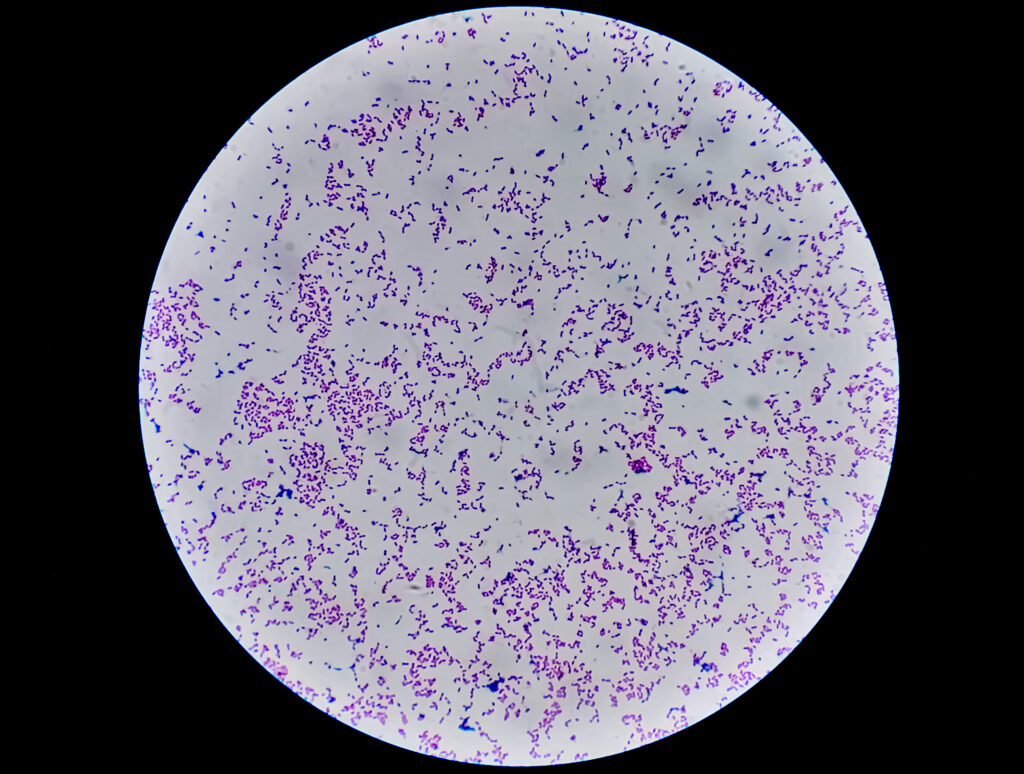
Parasitic Gastroenteritis
Finally, other microorganisms can be the cause of gastro, particularly parasites:
- Amoebas
- Giardia intestinalis
- Cryptosporidium parvum
There is also Entamoeba histolytica, which is a very rare parasite that causes bloody diarrhea and appears in regions where hygiene is lacking.

Rarer Forms
However, there are other, rarer origins of gastroenteritis:
- allergic gastroenteritis: eosinophilic gastroenteritis causes inflammation that is triggered by the ingestion of an allergen. About half of the patients with this form of gastro have concomitant allergic diseases: allergic rhinoconjunctivitis, asthma, eczema, food allergies, etc.
- chemical toxins: on one hand, they can come from plants, poisonous mushrooms, exotic fruits, etc. And on the other hand, from the consumption of foods contaminated with arsenic, lead, mercury, cadmium, etc.
- medications and their side effects: many medications cause side effects similar to the symptoms of gastro (diarrhea, nausea, vomiting, etc.). Here is a non-exhaustive list:
- laxatives
- antibiotics
- antacids with magnesium as a base
- radiotherapy
- chemotherapy drugs
- human anthelmintics
- Digoxin (to treat heart disorders)
- Colchicine (to treat gout)
- etc.
Beyond the symptoms caused by antibiotics, this treatment can also cause gastroenteritis by Clostridium difficile, which – as we have seen earlier – is a bacterium.
Caution! Do not confuse diarrhea caused by medication side effects with gastroenteritis caused by medications. Indeed, it can be difficult to differentiate the two cases. In this situation, your doctor will first ask you to stop taking the medication in question. Afterwards, you may continue your treatment. If the symptoms stop when the medication is discontinued, and return upon resumption, then the medication is to blame. Your practitioner will likely demand a definitive stop of the treatment if the gastroenteritis proves to be serious.
Symptoms
Gastroenteritis causes numerous and very unpleasant symptoms:
- nausea
- vomiting
- abdominal cramps
- diarrhea
- loss of appetite
- fever
All these symptoms can in turn lead to dehydration, especially if you have several symptoms at the same time (diarrhea, vomiting, fever). Consequently, an imbalance in blood biochemistry occurs since the loss of bodily fluids is very high.
Solution! Oral rehydration solution (ORS) is a mixture mainly composed of sodium, potassium, sugar, and chlorine. Packaged in sachets to be dissolved. It allows the body to rehydrate and avoid having to go through rehydration in the emergency room (intravenous route).
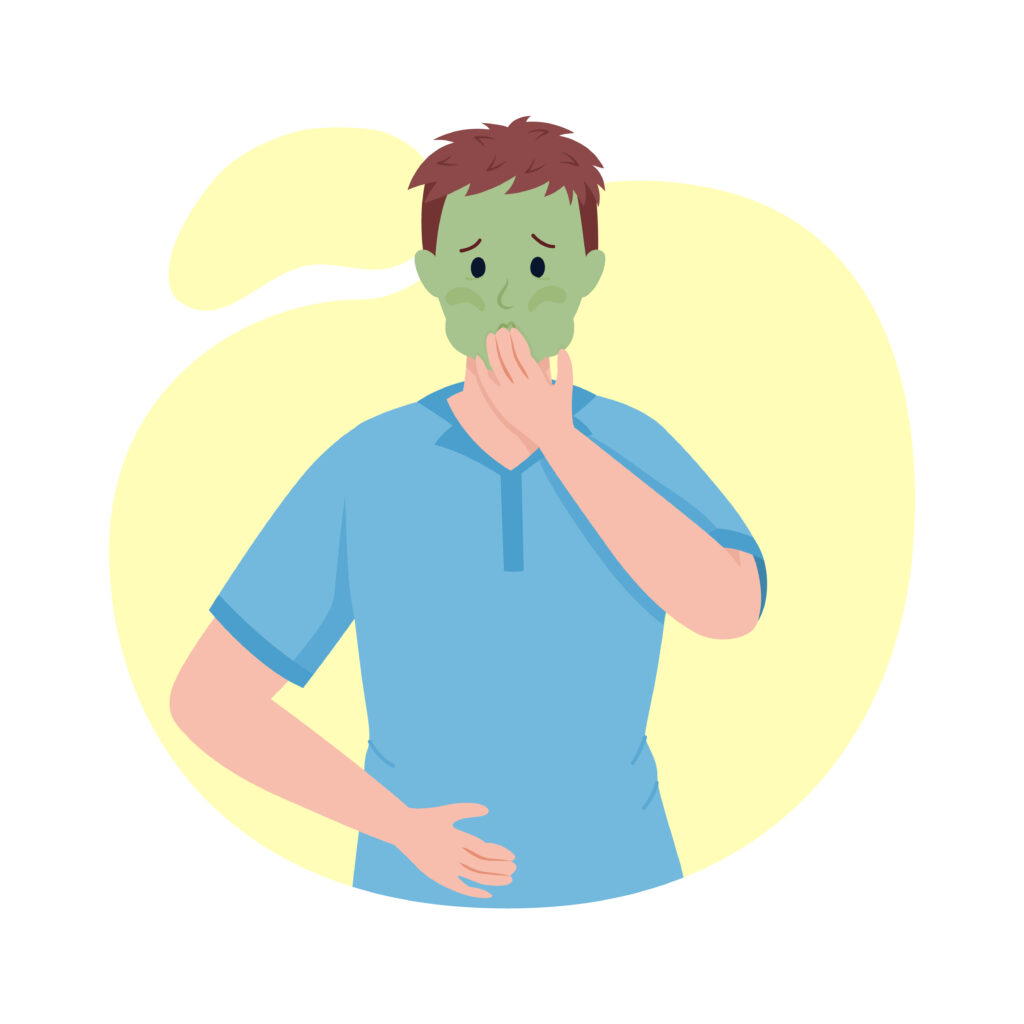
The Causes and Modes of Transmission of Gastroenteritis
You now know that there are several types of gastroenteritis. Consequently, the causes of catching it are diverse and varied. Discover them in this chapter.
Food
The consumption of foodstuffs touched by contaminating agents is a cause that triggers gastroenteritis. Especially if these foods are consumed raw or not sufficiently cooked. This is the case with seafood, poultry, meats, eggs, etc. The consumption of fruit juices or milk can also prove dangerous if the products are not pasteurized.
There are two categories of infected foods:
- foods contaminated by a toxin: the two bacteria mainly responsible for this poisoning are Staphylococcus and Bacillus Cereus. These bacteria produce a toxin that resists heat in food.
- foods contaminated by bacteria: On the contrary, C Perfringens and E.Coli, which have a toxinogenic action, only produce the toxin once the food is ingested, in other words, when the dish is in the intestine.
Water
Water is also a major cause of transmission of gastroenteritis.
On the one hand, drinking water contaminated by any microorganism leads to gastroenteritis.
On the other hand, whether it is well water, water from swimming pools and various water parks, or water from streams; it is enough that a person carrying the virus, bacterium, or parasite bathes or touches the water – without having previously washed – to pollute the watercourse and thus affect other people present in the water. You now understand how exponential this mode of transmission can be.

The Fecal-Oral Route
It is possible to spread contamination through people and objects: this is what we call the fecal-oral route.
An infected individual who does not wash their hands properly and then touches another person can spread the infection. If this second person – who has been in contact with the infected individual – touches their face, or prepares food without first meticulously washing their hands: they will also be infected.
The same pattern is possible with objects. If a person, after changing the diaper of a baby with gastroenteritis or after helping a sick child to go to the toilet, does not meticulously wash their hands; and then touches various objects (door handles, telephone, remote control, toys, etc.), all these objects will be contaminated. And anyone who subsequently comes into contact with these objects, who touches their face or eats without first washing their hands, will be contaminated.
This mode of transmission is also very rapid, and it underscores the fundamental importance of handwashing.
Animals
Animals are not immune to gastro, and some of them can be carriers of various infectious microorganisms. Notably bacteria: Salmonella, E.coli, etc. Here is a non-exhaustive list of the animals concerned:
- birds
- reptiles (lizards, etc.)
- amphibians (frogs, turtles, etc.)
- zoo animals
- dogs and cats with diarrhea (more rarely)
Important to know! Viral gastroenteritis can also be transmitted through saliva: whether it occurs during a sneeze, a coughing fit, or vomiting. The droplets projected carry the virus, which is also present in the mouth of any infected person.
The Risks of Gastro
Dehydration
The main risk of gastro is dehydration. Indeed, the loss of fluids during the onset of symptoms can be very high. Considering that your body is made up of 65% water (according to the CNRS), you understand how essential this element is to our organism. In cases of severe dehydration, rehydration is done intravenously in an emergency: the doctor administers a chloride-based solution. If the loss of water is too high, the consequences can be fatal.
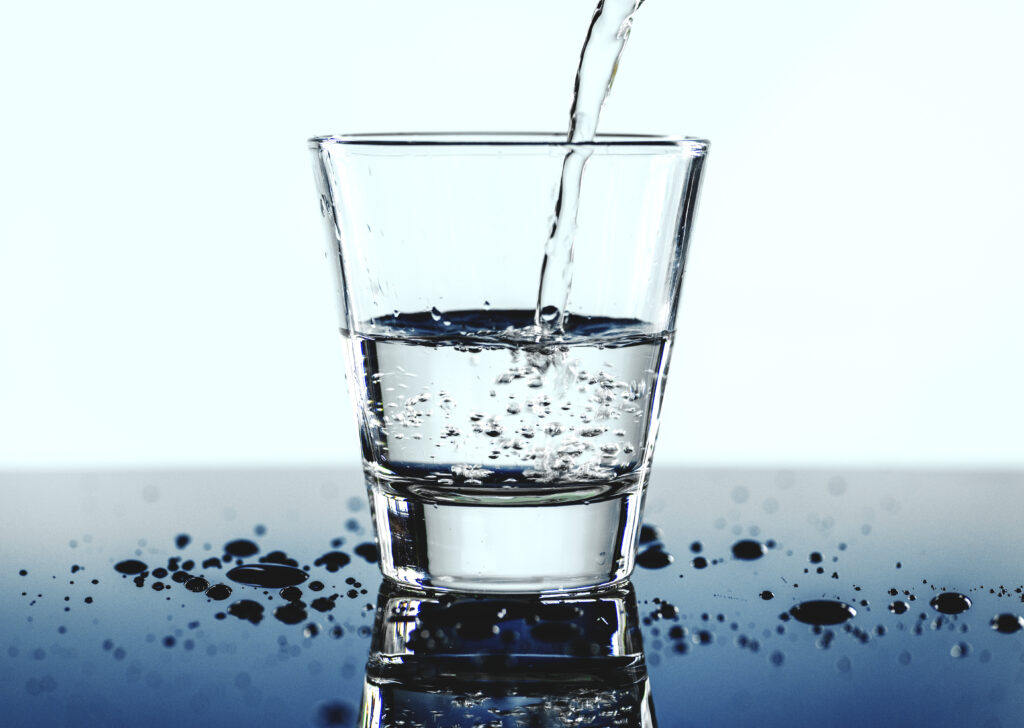
Gastric Burns
In rare cases, gastro that causes repeated vomiting can lead to gastroesophageal reflux. If you experience regurgitations, intense chest pain and/or burning; and this even after the end of your gastroenteritis: it is absolutely necessary to consult a specialist in gastroenterology.
How to Treat Gastro?
There is no standard treatment for gastro, apart from analgesics that are used to reduce fever and abdominal pain, doctors may sometimes prescribe medications to counteract side effects; or an antiparasitic in the case of parasitic gastroenteritis.
Prevention and following certain measures can help you avoid or – if you have already caught it – reduce the discomfort of the disease’s effects.
Prevention
This is the best way to protect yourself from this condition. Be sure to scrupulously follow these rules during the onset of autumn:
- wash your hands meticulously: this rule applies throughout the day, but especially in two cases:
- after being in contact with fecal matter (stools, baby diapers, etc.)
- before preparing a meal, or eating
- wash fruits and vegetables thoroughly before eating them
- keep your food cool, strictly respecting the cold chain
- cook your food sufficiently
- ensure you drink uncontaminated water
- clean your interior with disinfectant wipes, making sure not to omit the most contaminated objects such as: door handles, mobile phone(s), remote control, etc.

Good to know! The use of a disposable hand dryer is preferable during a gastro episode. Although it is not an ecological solution, it is the best way to avoid transmission. Indeed, towels are real breeding grounds for germs.

Nutrition
Eating can prove to be difficult during a bout of gastroenteritis, as the symptoms are directly related to the digestive system. This includes vomiting, abdominal pain, and lack of appetite. However, eating is essential and greatly contributes to your recovery during gastroenteritis. Small portions throughout the day are recommended, but it’s important to know what to eat!
What to eat during gastroenteritis?
The choice of food to consume during gastroenteritis should be based on two main objectives: restoring intestinal transit and rehydrating the body.
Restoring intestinal transit:
- Foods rich in pectin and starch: for example, apples, bananas, pasta, rice, cornstarch, etc. Carrots are also known to be beneficial during an episode of gastroenteritis. However, the consumed foods should at the same time be low in fiber to avoid the opposite effect.
Rehydrating the body:
- Liquid foods are welcome: including broths, soups, herbal teas, and other low or unsweetened beverages.
Foods to Avoid
Conversely, there are certain foods to eliminate from your diet when suffering from gastroenteritis:
- Dairy products and milk-based items
- Fatty foods
- Sugary products
- Any foods that promote intestinal transit such as fibers, etc.
Consult a Doctor
When symptoms of gastroenteritis appear, it is important to consult a gastroenterology professional without waiting for the symptoms to worsen. Our extensive team of professional gastroenterologists, located in the heart of Brussels, will be pleased to welcome you to our clinic.
If you are suffering from one or more symptoms of gastroenteritis, do not hesitate to make an appointment with our gastroenterology center, or with the gastroenterologist closest to your location.
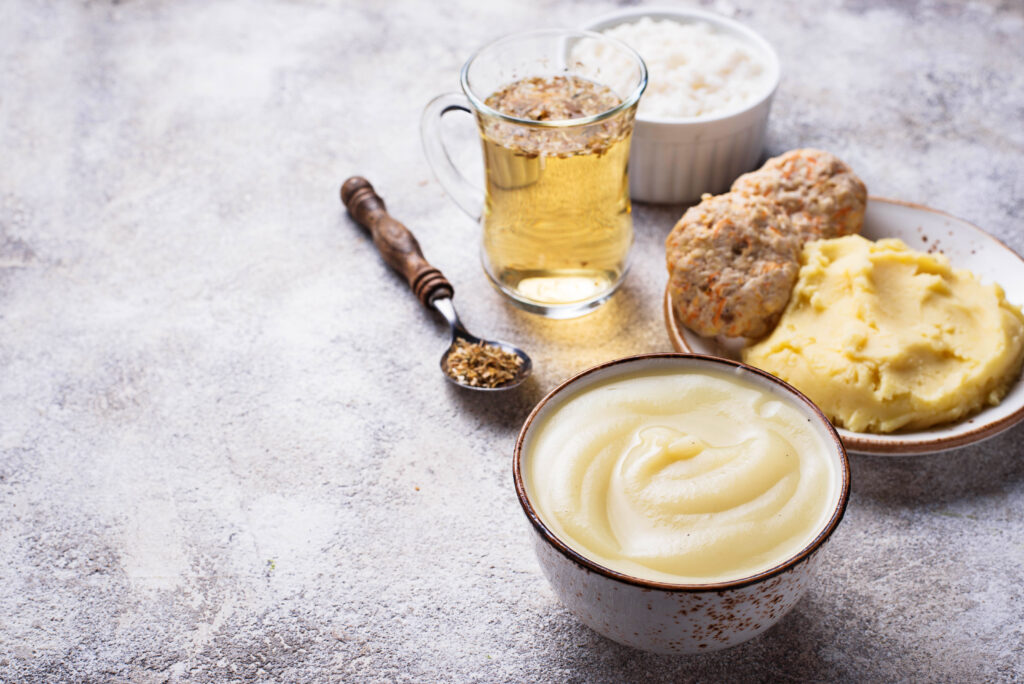
Key Takeaways on Gastroenteritis
In this file on gastroenteritis, we first discovered that there are various types of gastroenteritis:
- virale gastroenteritis
- bacterial gastroenteritis
- parasitic gastroenteritis
Secondly, we listed the symptoms of this condition:
- lack of appetite
- fever
- abdominal cramps
- nausea
- vomiting
- diarrhea
Then, we studied the different modes of transmission of this disease:
- infected food
- contaminated water
- the fecal-oral route through people and/or objects
- animals
Followed by their consequences and risks:
- dehydration
- gastric burns
And finally, the different ways to fight against gastroenteritis:
- prevention by having strict food hygiene
- the diet to favor: foods such as rice, carrots, starches, etc.
- the diet to avoid: all fatty and/or sugary preparations
- consult a gastroenterology specialist: our vast team of professionals is at your disposal for any medical consultation.
Schedule a consultation for gastroenteritis
Gastroenteritis can be uncomfortable and debilitating, but prompt management can greatly help. If you are suffering from gastro symptoms, our team at DDG Clinic in Brussels is ready to offer you a medical evaluation and tailored treatment to alleviate your symptoms and speed up your recovery.



